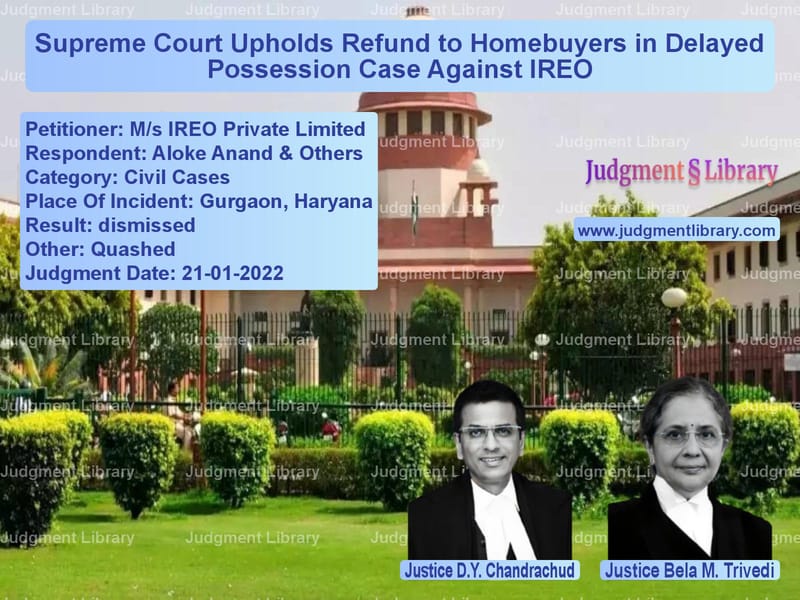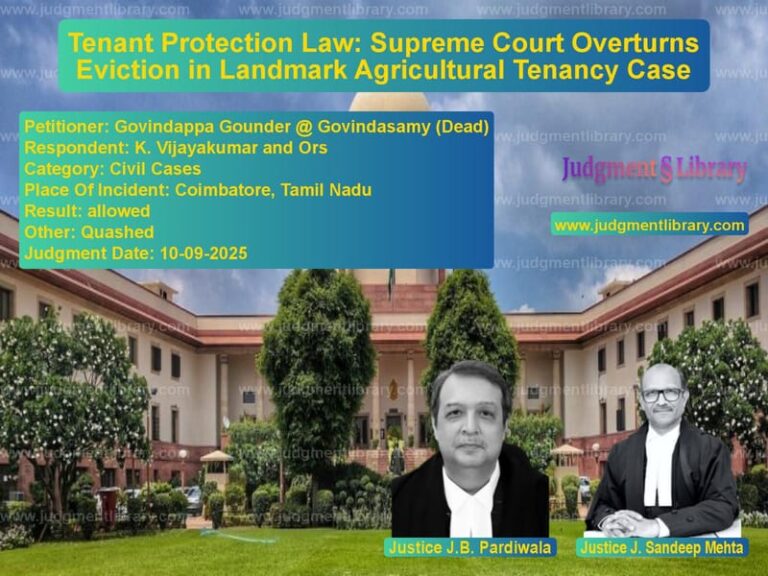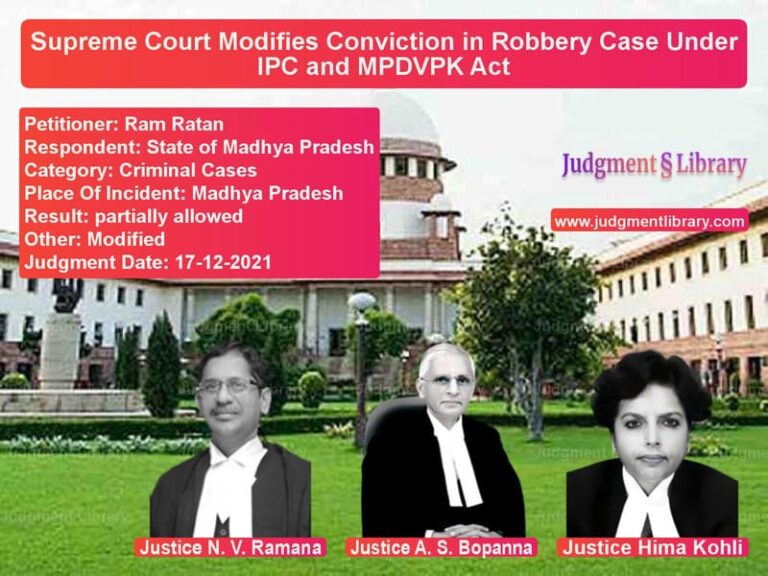Supreme Court Upholds Refund to Homebuyers in Delayed Possession Case Against IREO
The Supreme Court of India, in a landmark ruling in M/s IREO Private Limited vs. Aloke Anand & Others, upheld the National Consumer Disputes Redressal Commission (NCDRC) order directing the real estate developer to refund payments with interest to homebuyers who faced unreasonable delays in possession. The judgment reinforces consumer rights in the real estate sector and sets a precedent for ensuring that developers adhere to contractual obligations.
Background of the Case
The case arose from multiple consumer complaints filed against IREO Pvt. Ltd., which launched a housing project named ‘SKYON’ in Sector 60, Gurgaon, Haryana. The project was advertised as a state-of-the-art residential complex with modern amenities, including home automation, Wi-Fi, and high-end security features. However, despite buyers making substantial payments, the project faced significant delays, leading to disputes over possession.
The key complaints included:
- Failure of the developer to deliver possession within the promised timeline.
- Non-fulfillment of contractual obligations regarding the promised amenities.
- Denial of a full refund despite excessive delays.
- Unilateral and arbitrary changes in project specifications.
The NCDRC ruled in favor of the homebuyers, directing the developer to refund the amounts paid along with interest at the rate of 10.25% per annum. Dissatisfied with the decision, IREO Pvt. Ltd. approached the Supreme Court.
Arguments by the Petitioner (IREO Pvt. Ltd.)
- The developer contended that the timeline for possession should be counted from the date of the Fire NOC (No Objection Certificate) rather than the date of approval of building plans.
- IREO cited the judgment in IREO Grace Realtech Pvt. Ltd. v. Abhishek Khanna, arguing that possession obligations should start only after obtaining statutory approvals, including fire clearances.
- The company asserted that the NCDRC had overstepped its jurisdiction by directing refunds when the primary relief sought by homebuyers was possession.
- IREO argued that the project was largely complete and that delays were attributable to external factors, including regulatory approvals and workforce shortages.
Arguments by the Respondents (Homebuyers)
- The homebuyers contended that the promised possession date was March 2015, but possession was still not granted in 2017, leading to prolonged financial hardship.
- They argued that the Fire NOC argument was invalid since the developer had already begun construction and raised financial demands before obtaining the clearance.
- The respondents pointed out that the project remained incomplete even after multiple extensions, and the developer had misrepresented the status of construction.
- The buyers maintained that they had sought refunds only as an alternative to delayed possession, and since possession was not granted in a habitable condition, they were entitled to a full refund with interest.
Observations of the Supreme Court
The Supreme Court bench, comprising Justices D.Y. Chandrachud and Bela M. Trivedi, upheld the NCDRC’s decision and reaffirmed the rights of homebuyers in cases of undue delay.
The Court noted:
“A homebuyer is entitled to possession within a reasonable timeframe as per the agreement. Delayed possession without justifiable cause constitutes a deficiency in service, warranting refund with interest.”
Regarding the developer’s claim that the possession timeline should begin from the Fire NOC date, the Court observed:
“The developer cannot shift the burden of statutory approvals onto homebuyers. If construction was initiated, financial demands raised, and payments collected before obtaining fire clearance, it is illogical to now argue that the period for possession should start post-clearance.”
The Court further stated:
“The agreement clearly specified a timeframe for possession. A delay of several years beyond the agreed period is an unfair trade practice. The buyers cannot be left in limbo indefinitely while waiting for regulatory approvals.”
The Supreme Court also rejected the argument that the NCDRC had exceeded its jurisdiction:
- “Consumer courts have the authority to grant effective relief, including refunds, when developers fail to meet obligations.”
- “Merely offering possession is insufficient if the apartment lacks basic amenities and is unfit for occupation.”
- “The NCDRC acted well within its jurisdiction in ordering a refund, as the developer failed to meet contractual and legal obligations.”
Final Judgment
- The Supreme Court dismissed IREO’s appeal and upheld the NCDRC’s order.
- IREO was directed to refund the amount of ₹2,23,91,480/- to the homebuyer, along with simple interest at 10.25% per annum.
- The Court reiterated that consumer protection laws apply strictly to real estate contracts, and developers cannot bypass obligations by citing regulatory delays.
- The ruling clarified that possession should be delivered in a complete and habitable condition, failing which buyers have the right to seek refunds.
Implications of the Judgment
- Strengthened Homebuyer Rights: The ruling reinforces legal protections for homebuyers facing delays in possession.
- Precedent for Future Cases: The judgment will serve as a benchmark for similar disputes where developers fail to deliver on time.
- Increased Accountability: Developers must now adhere strictly to possession timelines and cannot use regulatory approvals as an excuse for indefinite delays.
- Consumer-Friendly Interpretation of Contracts: The ruling emphasizes that homebuyer agreements should be interpreted in favor of buyers rather than developers.
Conclusion
The Supreme Court’s decision in this case is a significant milestone in consumer rights jurisprudence. It ensures that developers are held accountable for delays and cannot unjustly withhold payments from homebuyers. By upholding the NCDRC’s directive for refunds with interest, the judgment serves as a strong deterrent against malpractices in the real estate industry. The ruling provides much-needed relief to homebuyers and reaffirms the judiciary’s commitment to fair trade practices in the housing sector.
Petitioner Name: M/s IREO Private Limited.Respondent Name: Aloke Anand & Others.Judgment By: Justice D.Y. Chandrachud, Justice Bela M. Trivedi.Place Of Incident: Gurgaon, Haryana.Judgment Date: 21-01-2022.
Don’t miss out on the full details! Download the complete judgment in PDF format below and gain valuable insights instantly!
Download Judgment: ms-ireo-private-lim-vs-aloke-anand-&-others-supreme-court-of-india-judgment-dated-21-01-2022.pdf
Directly Download Judgment: Directly download this Judgment
See all petitions in Consumer Rights
See all petitions in Property Disputes
See all petitions in Contract Disputes
See all petitions in Damages and Compensation
See all petitions in Judgment by Dhananjaya Y Chandrachud
See all petitions in Judgment by Bela M. Trivedi
See all petitions in dismissed
See all petitions in Quashed
See all petitions in supreme court of India judgments January 2022
See all petitions in 2022 judgments
See all posts in Civil Cases Category
See all allowed petitions in Civil Cases Category
See all Dismissed petitions in Civil Cases Category
See all partially allowed petitions in Civil Cases Category







